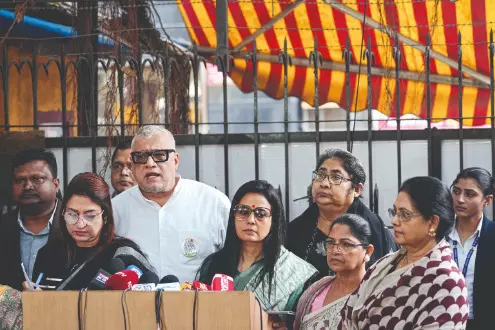TMC: ‘CEC has blood on his hands’; over 40 ‘SIR-linked’ deaths in Bengal

Kolkata: After meeting the full bench of the Election Commission of India (ECI) in Delhi, a Trinamool Congress delegation on Friday accused the Chief Election Commissioner (CEC) Gyanesh Kumar of having
“blood on his hands” as 40 Special Intensive Revision (SIR) related deaths have taken place in Bengal so far.
The ruling party in Bengal also claimed that the ECI failed to answer five questions raised by them during the meeting. The delegation, led by Trinamool Congress Rajya Sabha leader Derek O’Brien, met the Election Commissioners amid the ongoing SIR of electoral rolls in Bengal.
The delegation consisted of Lok Sabha MPs Mahua Moitra, Satabdi Roy, Kalyan Banerjee, Pratima Mondal, Sajda Ahmed, and Rajya Sabha MPs Dola Sen, Mamata Thakur, Saket Gokhale, and Prakash Chik Barik.
O’Brien, while speaking to the reporters after the meeting, said the party raised five questions, but Chief Election Commissioner (CEC) Gyanesh Kumar did not give any answers.
“We started the meeting by stating that the CEC has blood on its hands. We raised five questions. After this, Kalyan Banerjee, Mahua Moitra, and Mamata Bala Thakur spoke and shared whatever they had to in about 40 minutes,” O’Brien said. “The CEC spoke uninterrupted for one hour. We were also not interrupted while we spoke, but we did not receive any answer to any of our five questions,” he added.
Mohua Moitra said the delegation shared with the CEC a list of 40 people whose deaths, they alleged, were linked to the SIR process. The commission, however, dismissed it as mere allegations, Moitra claimed.
Trinamool Congress is not opposed to the concept of SIR, but is “strongly opposed to the unplanned manner in which the CEC and EC are going about the job”, O’Brien stated. The CEC appeared surprised when the list of those who died due to the SIR process was shown to him, he added further.
“Among the five questions we raised, the first was this: Is the SIR process meant to filter out fake voters and infiltrators from the voter list? If so, why are Bengalis being specifically targeted? Is this an intention to drive out Bengalis?” asked party MP Satabdi Roy. She further asked: “If the objective is to identify and filter out infiltrators, then why is Bengal being singled out when the problem exists in other States like Tripura, Mizoram, Nagaland, and Arunachal Pradesh as well? Why is only Bengal being targeted when the same issue of infiltration is not being addressed in other States?”
“We began by giving them the list of 40 people who have died, whose deaths are directly linked to the SIR process. The CEC said these were mere allegations. To our surprise, it seemed that both the DEO office in West Bengal and the CEC had no knowledge of the deaths of these BLOs,” Moitra stated.
“We asked how many non-citizens had actually been removed from the voters’ list through the SIR process. You said the number was in lakhs, yet we are not aware of even a single non-citizen whose name has been removed, as documented by the media,” added Moitra.
Later in the day, TMC national general secretary Abhishek Banerjee wrote on X: “The Election Commission is deliberately planting selective leaks to falsely claim that they have provided a point-by-point rebuttal to the issues raised by the AITC delegation today…”.
The TMC Parliamentary delegation raised serious objections to the ongoing SIR of electoral rolls, alleging bias, procedural flaws, and grave human consequences linked to the exercise in West Bengal.
The delegation alleged that if infiltration is the core concern, similar such exercises should have been undertaken in other border states like Tripura, Meghalaya, Mizoram, Arunachal Pradesh, Nagaland and Manipur. They further pointed out that even in Assam, a full-scale SIR was not implemented, and a “Special Revision” was carried out.
The representatives further asked how electoral rolls used for the election of the Lok Sabha barely a year ago and for three successive Assembly elections could become suspect all of a sudden. They contended that if the rolls were indeed defective, then the validity of the Parliament elected on the basis of those rolls needed to be under question as well. As far as the AITC is concerned, millions of voters queued up exercising their franchise with faith in the veracity of those very rolls that are now being questioned. The party put special emphasis on the human cost related to the SIR process. It said that across states, including West Bengal, 41 common citizens and 19 Booth Level Officers (BLOs) have been affected owing to the unplanned and harsh implementation of the exercise. Of the common citizens, 35 reportedly died while six are still under medical treatment. Among BLOs, four reportedly died and 15 are hospitalised or under treatment. The delegation accused the Election Commission of putting inhuman pressure on BLOs who were inadequately trained, given unrealistic deadlines, and without much administrative support, which caused them extreme mental and physical distress. The party blamed the Election Commission and the Chief Election Commissioner personally for these deaths.
Citing developments in Bihar, the delegation alleged that efforts had been made to selectively interpret the Model Code of Conduct to impose new restrictions on mobilisation and spending, besides provisions for digital complaints that they claimed favoured the ruling party.



